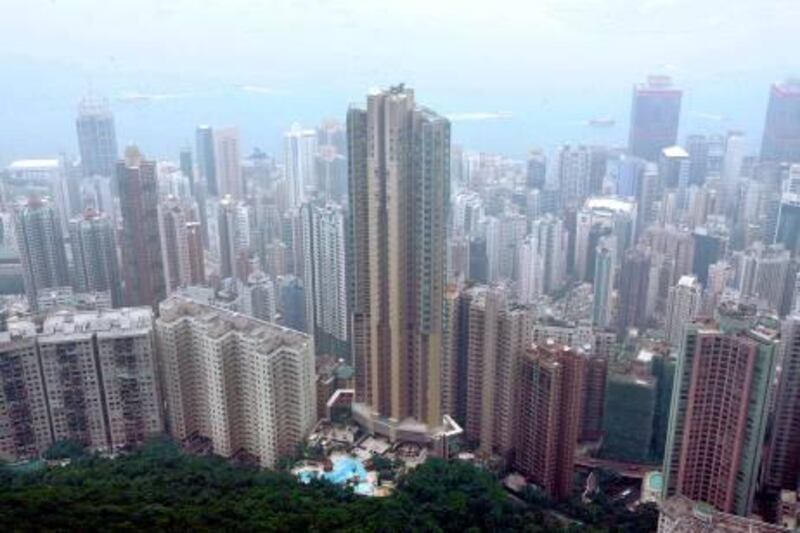It is one of the typical images of Hong Kong's booming property market. Standing in an estate agent's office, a Mandarin-speaking buyer from mainland China haggles with a Cantonese-speaking Hong Kong realtor about a luxury apartment.
The buyer has been lured by a leaflet handed out on the street as Hong Kong residents watch but he's angry at how the influx of money from across the border is making it difficult for anyone from the former British colony to buy an apartment.
Demand from the mainland, combined with historically low mortgage rates and restricted supply, has pushed home prices in Hong Kong up 45 per cent since the end of 2008.
More than one third of the higher-end property in Hong Kong was bought by mainland Chinese buyers in the first half of this year. Last year they bought a fifth of the higher-end properties available, and 15 per cent in 2008.
With this in mind, Hong Kong last month suspended offering residency rights to investors who buy property in the city as part of the government's increasingly desperate efforts to curb soaring property prices that have unsettled many residents.
Locals can no longer afford to buy homes and there are fears that social stability could be undermined by the huge influx of mainland Chinese buying apartments.
"Stabilising property prices is our top priority. We will not allow a bubble to be formed," Donald Tsang, the chief executive of the Hong Kong special administrative region of the People's Republic of China, said as part of his annual policy address.
"Many find it unnerving that property prices have kept rising and years of hard-earned savings cannot even cover a down payment."
Many mainlanders took advantage of a 2003 programme called the capital investment entrant scheme, which allows foreign investors to obtain residency once they invest HK$6.5 million (Dh3m) in Hong Kong property, shares or other assets.
It is an attractive place to live with a solid legal and accounting system, low taxes, a decent education system and health care, and a lifestyle famous around the region.
So far, more than 8,000 people have signed up, 80 per cent of them from mainland China.
Tu Yijuan, the manager of Shenzhen Overseas Education and Immigration Consulting Services, a company organising immigration for mainlanders keen to settle in Hong Kong, says speculation about the rule changes had led to a flurry of applications.
"Right before this statement, there was a crazy number of applications from people in Shenzhen, as many in one day as in a whole month before, because people heard about something happening and they wanted to be one step ahead," Ms Tu told Sohu.com.
In one weekend in September, the number of used home sales in some of Hong Kong's biggest private housing estates jumped 90 per cent, despite the cooling measures, according to the city's biggest private property broker, Centaline.
But a closer look at the figures show immigration-linked purchases represent only 1 per cent of total property market turnover in Hong Kong. The government also emphasises the move is temporary as Hong Kong needs the mainland's input to thrive in the long term.
The territory's government has a major say in controlling the property market because it owns all of the land and decides when to release plots for auction. This year, there has also been a rise in stamp duty, an increase in the down-payment ratio needed to buy property and an acceleration in land sales.
To cool the overheating property market, Hong Kong authorities have been busy creating supply and Mr Tsang expects 61,000 new homes to come on to the market in the next three to four years. In the past 10 years, an average of 18,500 new homes were sold annually, he says.
The building and completion of homes almost doubled in the September quarter from the three months before, Hong Kong's transport and housing bureau says.
The completion of private residential units rose to 4,100 in the period, up from 2,100 in the second quarter and bringing the total to 11,100 so far this year, while the construction of private residential units increased to 5,100 in the third quarter from 2,500 in the previous quarter. That has taken the total to 11,700 units for the first nine months.
Shih Wing-ching, the chairman of Centaline, believes the bigger picture is more important. The property market in Hong Kong is heavily influenced by the mainland but the US dollar remains the deciding factor as the Hong Kong dollar is pegged to the greenback.
"Since there is no evidence showing the US is willing to pay back their billions of debts the only way to solve the problem is depreciation, and the Hong Kong dollar will depreciate as much as the US dollar. This means house prices will rise by the same amount," Mr Shih says.





